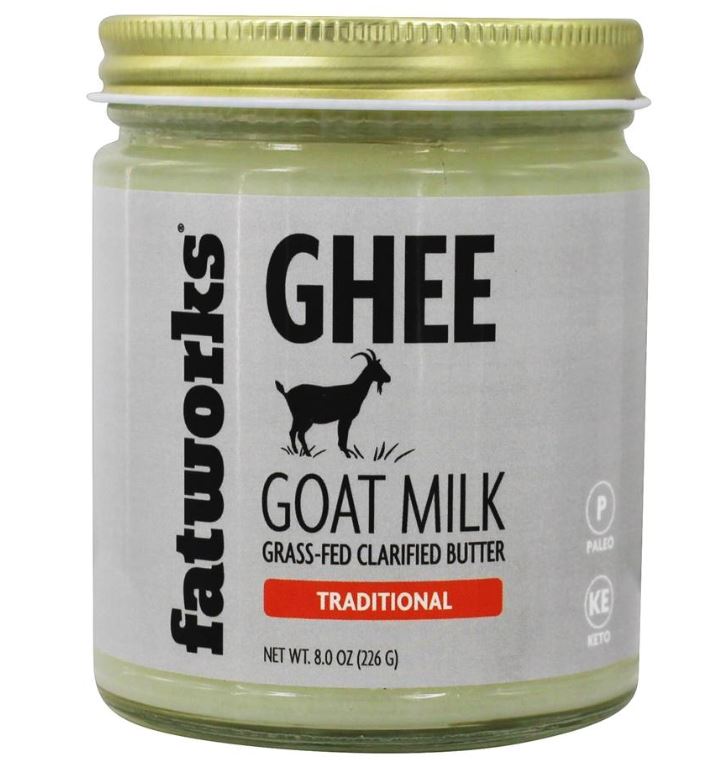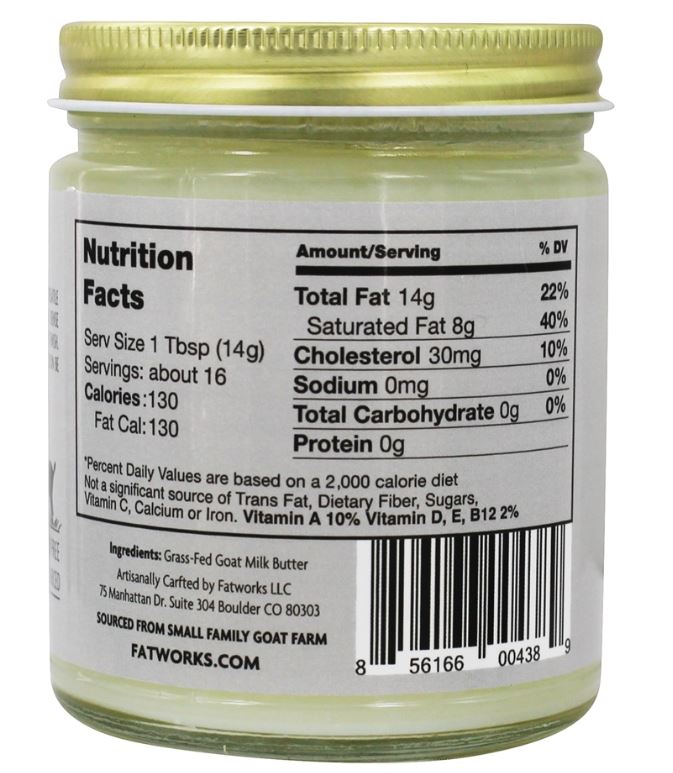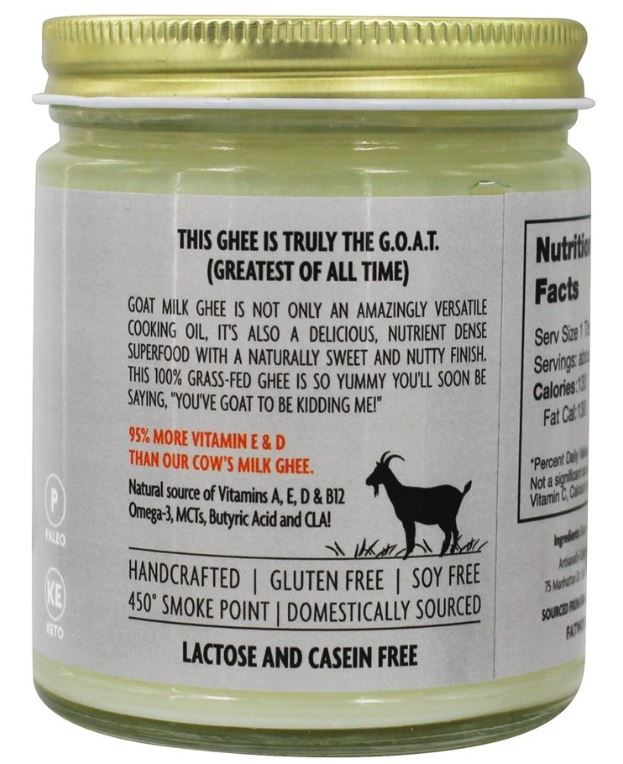Overview
Description
Fatworks - Goat Milk Ghee Traditional - 8 oz. (226 g)
Grass-Fed and Way Beyond Organic Goat Milk Ghee 8 oz: So good you'll say, "You've Goat to be kidding me!" If you love goat milk, goat butter or goat cheese (and even if you don't) you'll love this ghee. Clarified and roasted to perfection, goat’s milk is considered naturally easier on the digestive system than cow's milk and is thought of as "cooling" in Ayurvedic circles. They think it's pretty cool too. A bit smoother and sweeter than cow's milk, goat’s milk ghee, is a perfect substitute for butter and other cooking oils. It has lots of vitamins. In fact it has approximately 100% more Vitamin D, A, and E than their cow's milk ghee! Domestically sourced from small family farms, this ghee is crafted from 100% grass-fed, pasture raised goat butter, which is then cooked and fine-filtered in small batches. Forgheedaboutit! Great for eating straight out of the jar, for baking, sautéing, frying, smoothies, even coffee. The smoke point is over 480 F. Fatworks Goat Milk Ghee is great for people on Keto Diets, is Paleo friendly, and is Lactose and Casein Free. Also a great source of Vitamin B12, Vitamin A, Vitamin E, Vitamin D, CLA, MCT and Omega 3s. It's truly the G.O.A.T. (Greatest of All Time).
- Perfect for your Paleo or Keto Diet
- Gluten-Free, Soy-Free, Lactose-Free, and Casein-Free
- Traditional Flavor Profile
Are there any artificial trans fats in Fatworks products and do they add anything to the fats?
They are sorry you even had to ask, but the answer is no, artificial trans fats are not traditional fats in anyway. Partially hydrogenated trans fat are anathema to everything Fatworks stands for. In addition, none of the raw fat that they render is processed, smoked, hydrogenated or otherwise altered in anyway. They add Organic rosemary extract to their lard and poultry fats to help the peroxide low during the rendering process.
What do Fatworks animals eat?
Hopefully, this is the first question you looked for when you came to their site. Nothing is more important to an animal's quality of life than what they eat and how they are raised. For this reason they only use Pasture-Raised animals. The cows they use only eat grass and the ducks and pigs eat what they find in pasture in addition to their non-GMO feed. Please note that they are not certified non-GMO since they use small family farms as their source and many of these farmers can not afford, or simply do not wish, to go through the certification process.
So what's in the feed you ask? It's a high quality non-GMO mix of grains and soy. Fatworks realizes some people are concerned about soy in particular because soy contains isoflavonoids which are biologically active compounds such as phytoestrogens. Some researchers believe these have a deleterious effect on the human body while other researchers will cite studies which claim that soy isoflavonoids are in fact beneficial. (Funny thing this food science.) For what it's worth, the founders of Fatworks try to avoid soy in their diet. That's why it was a happy day indeed when they received the email from the lab which stated, "it doesn't look like there are any "isoflavonoids" in the duck fat." A little known fact is that the isoflavonoids, it seems, are absorbed in the muscle meat and possibly the organs, but not the fat! The same principle applies for grain proteins such as gluten. Gluten is not absorbed into the fat of animals. Therefore Fatworks fats are, of course, gluten free.
Fatworks would like to stress once again that all the farmers they source from state that the soy or grains they use are non-GMO. Again, these are PASTURED ducks, pigs and cows. If you know anything about standard farming practices you know this is very rare indeed. Unlike the vast majority of ducks and pigs raised in the U.S., the animals they source feed on true pasture which provides them grass, grubs, clover and anything else they would eat in nature, making for a much more rounded fatty acid profile. Conceptually they would love, love, love to rid soy and even grains from all animal food supply, but this would literally starve the animals on pasture. It is currently only possible to feed without grain supplementation on very, very small farms, most of which are not USDA certified.
They thought long and hard about what they would permit in the feed of their products and basically it came down to this: They were not going to let the "perfect be the enemy of the good". Their mission is and has always been, to provide the best fat possible with the resources available. They created Fatworks to provide people with a healthier and better tasting alternative to trans fats and highly oxidizable industrialized seed/vegetable oils such as corn oil, sunflower seed oil, canola oil, etc. and they believe that they are making a difference. More people are starting to cook with REAL oil again for the first time in two generations, you know, back before heart disease and diabetes were epidemic. Sometimes they get a little carried away when they talk about traditional fat, especially when their supporters know and care enough to ask the right questions!
Are Fatworks Products "Organic"?
No. They are not "Certified" Organic, but for fat's sake, please read on! When it comes to say, an apple, they understand that having an organic certification is a great way to quickly know if a product meets a certain level of quality. However, they think the USDA falls short on their overall standards for certain organic certification. They believe for example that a bird raised in a cage can somehow be living an "organic" life. They do not agree. What they DO believe is in their farmers. They search for farmers who have standards that they believe exceed the USDA in every way. The animals they use are Pasture-Raised, Hormone-Free, Antibiotic-Free, Chemical-Free, and are raised by farmers doing it right! So even though they can't say that they sell organic lard, organic tallow or organic duck fat, if you know much about duck and pig farming you will know that Fatworks products are FAR, FAR beyond standard. For us it comes down to making the healthiest lard, healthiest tallow and healthiest duck fat. To this end they believe in their farmers, not the government.
Please note that they are not trying to disparage true organic farmers in any way. There are some small, and even some large companies who are organic and deserve your full support, however those companies are quickly becoming the minority. In fact, it is becoming clear that organic labeling no longer represents the small farms that it was designed to promote and instead has become, for the most part, a marketing tool for "Big Food" and "Big Agriculture".
Are Tree Nuts, Soy, Peanuts or Gluten in the facility where the fats are processed or jarred?
Yes, however if you are allergic to those let Fatworks put your mind at ease. They use a shared facility but they never share the facility with anyone else the day that they render. Here's how it works... Let's say that a soup company was making a soup on Monday, well, after they are done making their soup they are required to sanitized all the kettles and surfaces areas and remove all product from the kitchen area. Now, let's say that on the next day, Tuesday, Fatworks is doing a rendering of Leaf Lard. What they do, and what they are REQUIRED to do, is to sanitize the kettles and surfaces before they begin the rendering. So, in short, the whole kitchen is sanitized TWICE before they do anything in the kitchen. If you are worried about cross contamination it is incredibly, amazingly and remarkably unlikely!
Dang! The jar lid is totally stuck, what can I do?
Those healthy fats giving you a healthy forearm workout? Means you probably got a bit of fat in the threads of your jar. Running the lid and jar under hot water for a minute should do the trick. You can also purchase one of their Fatworks jar grips. After all there's a reason they make them.
How does Fatworks dispose of used fat?
Restaurants recycle theirs so you can too. It can be cleaned and used in the production of biodiesel fuel. Many municipalities will now accept cooking oil for this recycling purpose. You may even find a friendly restaurant that will accept your used fat and include it with their oil recycling. If circumstances make recycling difficult for you then put it in a sealed non-recyclable container and throw it in the trash. (Not recommended).
Where does their product originate?
From farms that they know and trust to do it right! They then render and filter all of their products in Colorado or Oregon. As an aside, they love the idea of sourcing locally but they love making the best fat possible more. At times these two noble ideals conflict. When they do, making the best quality fat products always trumps sourcing locally.
Can I feed it to my pet?
Only if you love them. Dogs and cats adore Grass Fed Tallow, Pastured Duck Fat and Pastured Leaf Lard. It's natural that they would. It's well known that cats and dogs in the wild always go for the fatty bits first. Here's what they recommend you do. Cut back a bit on your pet's food then add a tablespoon or two of Fatworks Grass Fed Tallow to the mix and you'll have a very happy friend.
Suggested Use
Spoon out required amount. Enjoy.
Ingredients
| Fatworks - Goat Milk Ghee Traditional - 8 oz. | |||||||||||||||||||||||||||||||||||||||||||||||||||||||||||||||||||||
|
|||||||||||||||||||||||||||||||||||||||||||||||||||||||||||||||||||||
| Other Ingredients: Grass-Fed Goat Milk Butter. | |||||||||||||||||||||||||||||||||||||||||||||||||||||||||||||||||||||
Questions & Answers
2 Reviews
Needless to say, after a week or so I quit using. They need to be smoother and actually have the ability to dissolve.




















It works!
Recommended by a friend
trying a new brand of zinc lozenge
Good for colds etc..